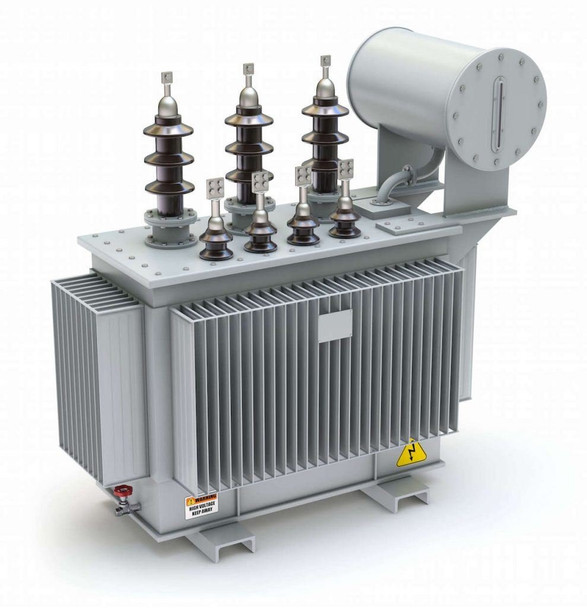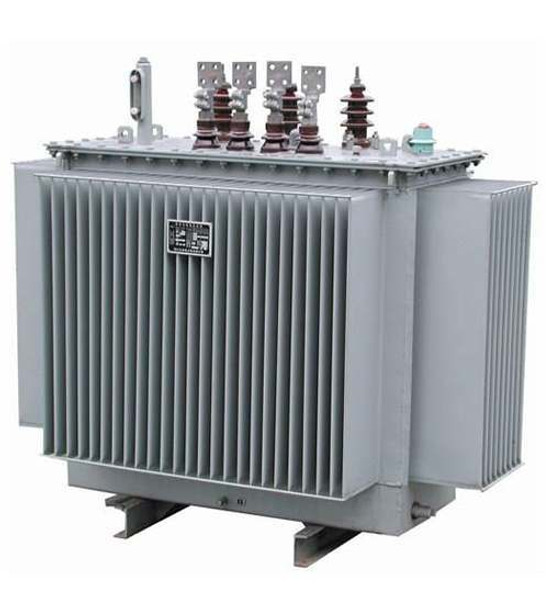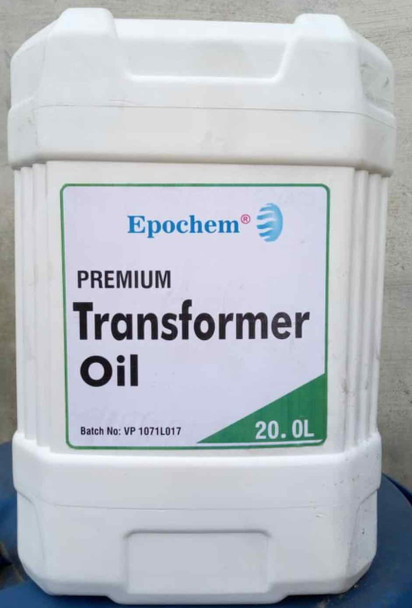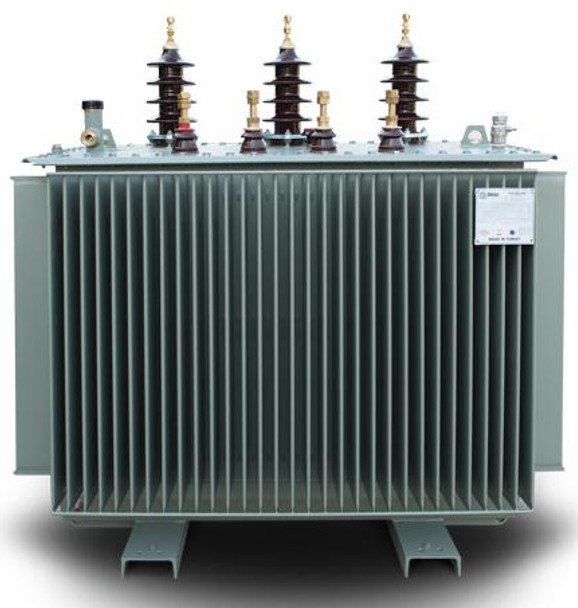Why Transformer oils are needed in Transformer Maintenance
The importance of oil in a transformer cannot be overstressed because the power transformer cannot perform its functions effectively without the oil insulating processes in all device parts, bringing us to what a transformer is and why transformer oil is essential for the efficient performance of the power transformer.
Power Transformer 100KVA 33/0.415KV
A transformer can be a passive component that transfers electrical energy from one electrical circuit to multiple circuits. It can also be seen as a steady electrical device that converts electrical energy from one source of the electrical circuit to another without any change of frequency through a means known as electromagnetic induction.
The essence of a transformer in the regulation of electrical energy is the ability to increase step up or decrease step down voltage levels between circuits, and just like every other mechanical equipment that needs oil for proper functions, the transformer is not as exceptional it requires the transformer oil that ensures proper functioning of the transformer because it is stable at very high temperatures, and it also has an excellent electrical insulating property.
The transformer oil is used in oil-filled transformers, some types of high-voltage capacitors, fluorescent lamp ballasts, and also some types of high-voltage switches and circuit breakers. It is also known as insulating oil, often used in electrical power transformers to prevent arcing and dissolve the transformer's heat. The transformer oil has various properties that distinguish it from other existing oil, such as reliable electrical-insulating properties.
The usefulness of the transformer oil is its use in the power transformer to prevent arcing, helps regulate the heat of the transformer, and acts as a coolant to protect the winging and core of the transformer, which is submerged within the oil.
Table of Contents
- What are the Types of Transformer Oil
- Benefits of Transformer Oil
- Transformer Oil Quality
- Maintenance of power transformer
- Transformer Oil Maintenance
- Properties of Transformer Oil
- Frequently Asked Questions About Transformer Oil
- Conclusion
What are the types of transformer oil?
Two types of transformer oil exist in the functionality of a transformer,
- Naphthenic based transformer oil
- Paraffinic based transformer oil
Buy Online Epochem premium Transformer Oil 20 liters
Naphthenic Oil
Naphthenic oil is more easily oxidized than paraffin oil. But the product of oxidation, i.e., the sludge that exists in this type of oil, is usually considered more soluble than the existing sludge gotten from the second type of oil, the paraffinic-based transformer oil.
Also, note that the sludge of this type of oil is not precipitated in the bottom of the transformer and therefore does not interfere in the convection circulation of the oil, which means that it does not disrupt the transformer cooling mechanism.
Characteristics of Naphthenic based transformer oil
- This mineral insulating oil is obtained from a particular crude with an extremely low n-paraffin known as wax.
- This oil's pour point is low compared with the paraffinic type due to less wax content.
- The boiling point of this oil is roughly 425°C.
- Compared with other types of oil, the naphthenic-based transformer oil is easily eroded.
- The oxidation products of this oil are usually soluble within it.
- This type of oil include aromatic compounds with a temperature that's relatively fewer at -40 °C
Paraffinic Oil
Although Paraffinic transformer oil features, a much lower oxidation rate than the Naphthenic-based transformer oil, the by-product called the sludge is regarded as insoluble, precipitates at the bottom of the tank, and obstructs the cooling system of the transformer.
The transformer oil's breakdown voltage(BVD) is also known as the dielectric strength. Breakdown voltage is measured by observing what voltage sparks strands between two electrodes immersed in the oil, separated by a specific gap. A low value of BDV indicates the presence of moisture content and conducting substances in the transformer oil.
This type of oil is also known as liquid paraffin or paraffin oil with a combustible hydrocarbon liquid that burns like fuel. This paraffin fuel refers to a mixture of the different types of hydrocarbons with the chemical formula CnH2n+2, and these kinds of paraffin are a group of alkanes with the following characteristics;
- Mineral insulating oil derived from certain crudes contains a substantial amount of n-paraffin(wax).
- This oil's pour point is high compared with the naphthenic type due to its high wax content.
- The boiling point of this kind of oil is about 530 °C.
- Oxidation of this oil is minor.
- Oxidation products are insoluble within the oil.
- Even though the naphthenic type is more readily corroded than paraffinic, the oxidation products are soluble within the oil, resulting in fewer problems.
Functions of Transformer Oil
Transformer oil possesses the following functions that make it essential for a transformer.
Coolant:
The primary function of transformer oil is that it acts as a coolant to the device; this is because a transformer coil is made of copper that carries high current and these coils becomes hot, and since the transformer oil is an excellent heat conductor, the temperature of the copper coils will therefore reduce the temperature of the coil. Consequently, the oil in the transformer plays a massive part in preventing the coil from burning.
Insulator:
The transformer oil works as an insulator. It includes high dielectric strength to resist a high voltage. Lastly, it maintains the transformer functions at all times, the reason it is used as an insulator within the transformer.
Corona Discharge :
It suppresses corona discharge and arcing caused by the ionization of some fluid, such as air surrounding a conductor that carries a high voltage.
A corona discharge occurs at locations where the strength of the electric field is high. It represents the local region where the air or other fluids undergo electric breakdown and become conductive, thereby allowing charge to leak off the conductor into the air continuously. So, the transformer oil aids in limiting corona discharges.
Power Transformer ABB 200KVA 11.0/0.415KV
Transformer Oil Quality
The quality of your transformer oil will affect the insulation and cooling properties as mentioned above, and under normal operating conditions, the minimal breakdown of oil will occur from oxidation and contamination as summarized as follows;
- The oxidation process is the acid that forms in the oil whenever it comes in contact with oxygen. This acid formed will then begin the sludge that settles on the windings of the transformer, thereby resulting in reduced heat dissipation. When this happens, the windings will run hotter, creating more sludge, creating more heat. And the high acid content and the increased temperature will increase the breakdown of the insulating qualities of the oil, and when it is left untreated, it will lead to transformer failure.
- The deposits commonly found in the transformer oil include water and particulates, and the presence of either of these will reduce the insulating qualities of the transformer oil.
- Good dielectric strength: This is an indicator used to assess the insulation properties of the transformer oil, and it is often equated with the breakdown voltage.
- Chemical stability
- Moisture repellant
- Reduced risk due to fire and explosion
Maintenance of power transformer
The power transformer must be functional almost always when connected; hence, it requires routine maintenance to ensure it performs optimally and stays so for a long time. The two primary types of care of a transformer are preventive and ad-hoc maintenance. Preventive maintenance involves performing regular and essential actions regularly to ensure it continues to serve very well. The other type of maintenance is as required, such as in an emergency or breakdown situation. The other name for preventive maintenance is called condition maintenance.
Transformer Oil Maintenance
Transformer oil is a mineral-based oil used for transformers because of its chemical properties and dielectric strength.
The transformer oil also acts as an insulator and a cooling agent. It is essential to have a proper preventative maintenance program because the oil will degrade, resulting in faults and costly repairs.
Testing
The testing process for transformer oil is vital in the preventative maintenance program. Annual testing will plot any changes internally in your transformer. It will help to know when the corrective measure is required, and the initial testing will help develop a baseline for comparison.
The five-part test is required in the annual maintenance program for transformer oil;
- Dielectric breakdown: The dielectric strength of the transformer oil measures the voltage that the oil can insulate against. Impurities can conduct electricity better than oil which lowers the dielectric breakdown of the oil.
- Acid Number/Neutralization: This type of test measures the level of sludge causing the acid present in the oil.
- Interfacial tension: This type of test helps identify some polar compounds: this also indicates the oxidation contaminates from the transformer material: paints, varnish, and paper.
- Colour: The appearance of the oil signifies the presence of contaminants, aging, and quality.
- Water content: This test indicates the amount of water in the transformer oil in parts per million because the water in the oil reduces the dielectric strength.
- Acidity: This proves that the edge of the transformer oil in the transformer must not exceed 0.2mg KOH/g oil. This is the critical acid number, and deterioration increases fast once this range is exceeded.
- Viscosity: The viscosity of the transformer oil is the resistance of the flow subjected to normal conditions.
The faults which occur while testing include the following.
- Corona Discharge Fault is When low energy discharges, then it will generate hydrogen, methane minor quantities of ethane and ethylene.
- Arcing Acetylene Fault is when vast amounts of acetylene, hydrogen, and small amounts of methane & methylene are generated.
- Overheated Cellulose fault occurs whenever the cellulose is excited, causing carbon monoxide.
- Overheated Oil fault involves overheating the oil, thereby generating ethylene & methane.
Ideal Properties of Transformer Oil
The properties can be distinct into electrical, chemical, and physical properties; these are the properties an oil should possess to be highly reactive.
- Electrical properties: One of the ideal properties of transformer oil is its ability to serve as an insulator. That is, it has dielectric strength. The insulator is the primary concern in this area. Every idea transformer oil should have a specific resistance level: the voltage divided by current and is sensitive to temperature change in the transformer. Furthermore, the oil dielectric dissipation factor will determine the amount of current that will inevitably leak out of the transformer.
- Chemical properties: The water content in the oil is not encouraged as it reduces the oil dielectric properties, thus reducing the sludge and acidity level to the minimum is encouraged.
- Physical properties: Every idea oil has a desirable high interfacial tension between the oil and water, i.e., the high flash point at which oil becomes volatile or combustible, and the low pour point, i.e., the temperature at which oil begins to flow freely.
- Power loss is less due to excellent dielectric properties.
- Better insulation values will be there between windings due to high resistivity.
- High performance
- Transformer oil will reduce Evaporation losses due to thermal stability and high flash point.
- Outstanding aging characteristics even in severe conditions
- The temperature range is more expansive.
- Low pour point.
Epochem premium Transformer Oil 20L
Where to buy Transformer Oil in Nigeria
GZ Industrial Supplies Nigeria has stocks of transformer oil that are of excellent quality. You can buy Transformer Oil in Nigeria at our offices below:
- GZ Industrial Supplies Lekki
Suite 10, Olive Plaza by Osapa London Bus Stop, Lekki, Lagos.
- GZ Industrial Supplies Ikeja
18 Adesina Street, Off Obafemi Awolowo Way,
Ikeja, Lagos.
- GZ Industrial Supplies Apapa
10 Apapa Oshodi Expressway, Coconut Bus stop Opposite Total Jetty,
Apapa, Lagos
- GZ Industrial Supplies Port Harcourt
238 Aba Road, Onyejieke's Plaza beside Fidelity Bank,
Rumuogba, Port Harcourt.
- GZ Industrial Supplies Calabar
30/32 Ndidem Usang Iso Road, Marian, Calabar.
- GZ Industrial Supplies Ogba
79 Yaya Abatan, by College Road Ogba, Lagos.
Tel. +234 8181069339, +234 8053390169 +234 8060907072
Frequently asked questions on Transformer oil
Q1- What is the oil used in the transformer?
Mineral oil and Synthetic oil are the majorly used transformer oil. These are petroleum products, like Naphthenic-based transformer oil and Paraffinic-based transformer oil.
Q2- What is the viscosity of transformer oil?
The viscosity is the resistance of flow in normal conditions, which is associated with its significant influence on heat exchange processes in oil-filled.
Q3- Which oil is best for a transformer?
Naphthenic mineral oil has long been the most preferred insulating liquid for power transformer insulation; this is because it has a good pouring point at low temperatures, good thermal cooling capacity, low cost, high efficiency, and availability on the transformers market.
Q4- What is the breakdown voltage of transformer oil?
It is found that the dielectric breakdown voltage of pure transformer oil is within the range of 10 kV with a gap distance of 1 mm between electrodes.
Buy Online... Power Transformer 50KVA 33.0/415KV Astor
About GZ Industrial Supplies Nigeria
GZ Industrial Supplies Nigeria is a company whose existence is premised upon the need for the distribution and supplies of industrial materials and as one of the homes of the most prominent direct marketers and premier distributors of all industrial materials, Metalworking and Maintenance, Repair, and Operations ("MRO") supplies, workshop tools, Lubricants, Chemicals, Cleaning and maintenance chemicals to industrial customers in Nigeria. Our good selection of lubricant with a low price and relatively high quality is one of the reasons we maintain a top position for the discerning project manager or for that DIY project you have started.
This transformer oil is available at GZ Industrial Supplies and is suitable for use in a wide range of static electrical devices such as the transformer.
Conclusion
Transformer oil plays a vital role in determining the life span of the transformer, just as we have seen in this article. A significant factor in guaranteeing the lifespan of your transformer is the ability to sort for the idea transformer oil with properties such as electrical, physical, and chemical properties. Also, running an annual maintenance check on your choice of transformer oil is very important.
Therefore, Transformer oil is needed to maintain the transformer as it acts as an insulator and cooling agent.
Contact us at GZ Industrial supplies for further details and the availability of transformer oil within the storefront in your location.












